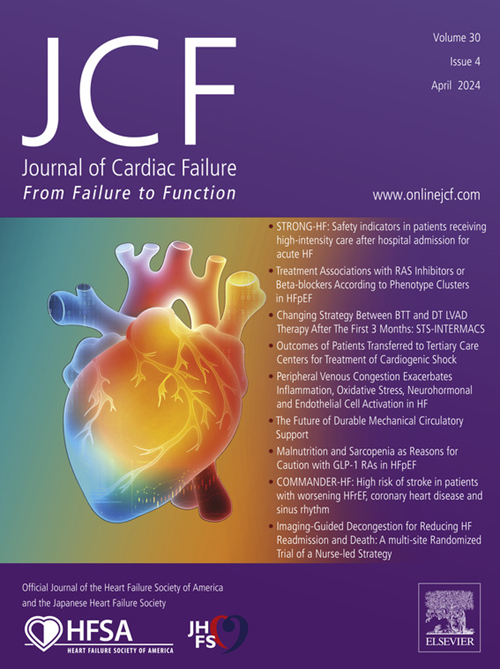The Psychometric Performance of the Kansas City Cardiomyopathy Questionnaire-12 in Symptomatic Obstructive Hypertrophic Cardiomyopathy
IF 6.7
2区 医学
Q1 CARDIAC & CARDIOVASCULAR SYSTEMS
引用次数: 0
Abstract
Background
A primary goal of treating patients with obstructive hypertrophic cardiomyopathy (oHCM) is to improve their symptoms, function and quality of life. Although the psychometric properties of the 23-item Kansas City Cardiomyopathy Questionnaire (KCCQ-23) have been described in oHCM, they have not been assessed for the shorter 12-item version (KCCQ-12), which is used increasingly in clinical practice.
Methods and Results
Using data from the EXPLORER-HCM trial, the psychometric properties of the KCCQ-12 were evaluated. The KCCQ-12 domain and summary scores had moderate correlations with the most relevant clinical (New York Heart Association class, exercise duration, peak oxygen consumption) and patient-reported measures (EQ-5D-5L visual analog scale, Work Productivity and Activity Impairment [WPAI] questionnaire, and Hypertrophic Cardiomyopathy Symptom Questionnaire [HCMSQ]). KCCQ-12 domain scores had strong internal consistency, and test-retest reliability, demonstrated significant and proportional changes with differing magnitudes of clinical change (assessed by the patients’ global impressions of change and the patients’ impressions of severity), and they demonstrated close equivalence to the KCCQ-23 scores.
Conclusions
The KCCQ-12 demonstrated good psychometric performance for patients with oHCM, comparable to that of the KCCQ-23, supporting its use in clinical practice to care for patients with oHCM.
堪萨斯城心肌病问卷-12 在有症状的阻塞性肥厚型心肌病中的心理测量性能。
背景:治疗阻塞性肥厚型心肌病(oHCM)患者的首要目标是改善其症状、功能和生活质量。虽然23项堪萨斯城心肌病问卷(KCCQ-23)的心理测量特性已在oHCM中进行了描述,但尚未对临床实践中越来越多使用的较短的12项版本(KCCQ-12)进行评估:利用 EXPLORER-HCM 试验的数据,对 KCCQ-12 的心理测量特性进行了评估。KCCQ-12的领域得分和总分与最相关的临床指标(纽约心脏协会分级、运动持续时间、峰值耗氧量)和患者报告指标(EQ-5D-5L视觉模拟量表、工作效率和活动障碍[WPAI]问卷以及肥厚型心肌病症状问卷[HCMSQ])具有中等程度的相关性。KCCQ-12的各领域得分具有很强的内部一致性和测试-再测可靠性,在不同的临床变化幅度(以患者对变化的总体印象和患者对严重程度的印象进行评估)下显示出显著的比例变化,并显示出与KCCQ-23得分接近的等效性:结论:KCCQ-12对oHCM患者具有良好的心理测量性能,与KCCQ-23相当,支持在临床实践中用于oHCM患者的护理。
本文章由计算机程序翻译,如有差异,请以英文原文为准。
求助全文
约1分钟内获得全文
求助全文
来源期刊

Journal of Cardiac Failure
医学-心血管系统
CiteScore
7.80
自引率
8.30%
发文量
653
审稿时长
21 days
期刊介绍:
Journal of Cardiac Failure publishes original, peer-reviewed communications of scientific excellence and review articles on clinical research, basic human studies, animal studies, and bench research with potential clinical applications to heart failure - pathogenesis, etiology, epidemiology, pathophysiological mechanisms, assessment, prevention, and treatment.
 求助内容:
求助内容: 应助结果提醒方式:
应助结果提醒方式:


